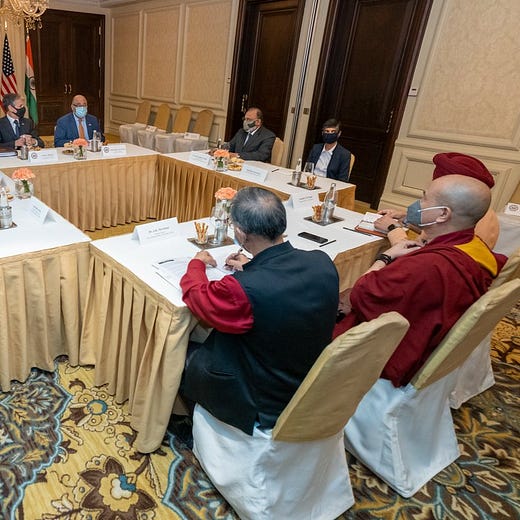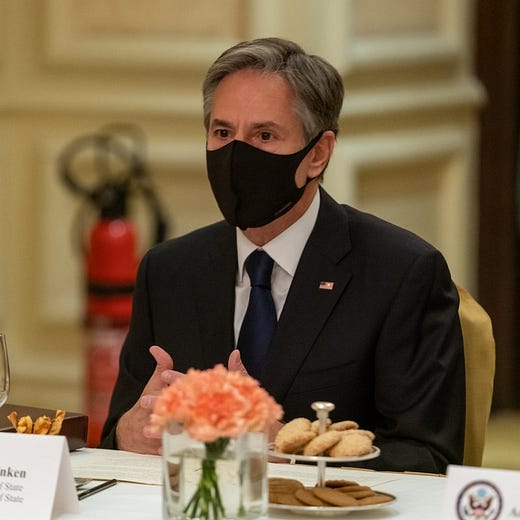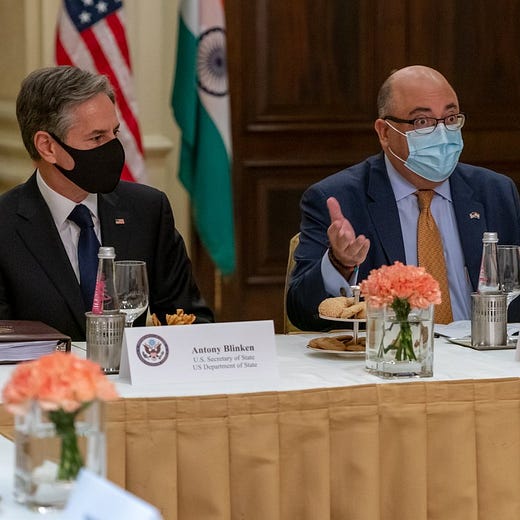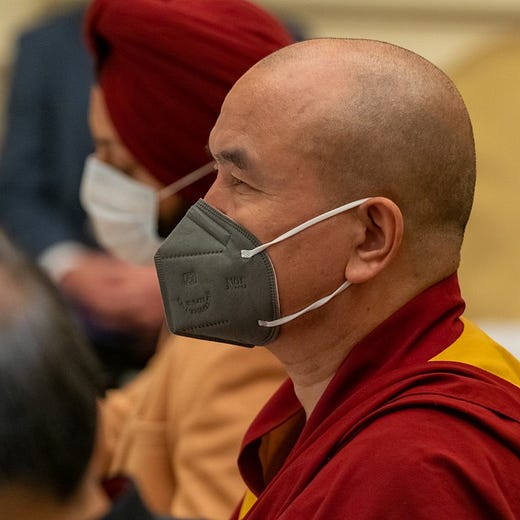Assam-Mizoram in Conflict, Strongman Image in Tatters; Opposition Speaks Tamil, and Meaning is Clear
Plus: Blinken to discuss geopolitics and sour real estate deal, torture in Kashmir, two Booker contenders from region, Jesse Owens endorsed Jai soap and Dholavira reveals Modi was student at 40
A newsletter from The Wire & Galileo Ideas | Contributors: MK Venu, Seema Chishti, Siddharth Varadarajan, Sidharth Bhatia, Sushant Singh and Tanweer Alam | Editor: Pratik Kanjilal
Snapshot of the day
July 28, 2021
Pratik Kanjilal
Yesterday in the Lok Sabha, Congress MP Jasbir Singh Gill led the sloganeering in Tamil, “Vendum… vendum…” while Opposition MPs followed on with, “Needhi vendum” ― “We want justice”. While Tamil united the Opposition parties, the TMC MPs stuck to their own slogan: “Khela hobe!” In the Rajya Sabha, the slogan was “Vendum, vivadam vendum” ― “We want debate” ― while the government was ramming through bills.
Speaking in English and Hindi, West Bengal chief minister Mamata Banerjee fielded questions from journalists in Delhi for over an hour today. She said the opposition will not drop the Pegasus issue till the truth comes out. She would not get into specifics but made it clear she and other opposition leaders are busy discussing how to mount an effective challenge to Narendra Modi in 2024.
Among the five Assam policemen dead in the clash with Mizoram police are three Muslims. And people are asking the obvious question of the Islamophobic Assam CM: “If a Muslim does a crime, no less than the CM tweets his name, giving out his religious identity, feeding widely pervading communal tensions. But when a Muslim dies in the line of duty, the same CM abbreviates his name which conceals his religious identity. Fair?”
Rakesh Asthana, the controversial Gujarat cadre IPS officer who had worked closely with Modi when he was chief minister, is Delhi’s new police commissioner. His appointment as CBI chief was not possible as per Supreme Court guidelines, which do not allow an IPS officer who has less than six months in office to be selected for a top law enforcement job. Not only has Modi appointed Asthana though he had four days to go for retirement but he got his cadre changed from Gujarat to that of Union territories, overnight. Asthana will be the first Delhi police chief to have been the subject of a corruption FIR; the Central Bureau of Investigation, where he worked till October 23, 2018, filed a case against him, which was eventually dismissed. This is an ongoing story.
The shocking trivialisation of policy statements has become a new normal. Like former health minister Harsh Vardhan had claimed that there was no shortage of oxygen when Covid patients were choking to death in Delhi, the Modi government has again shown that its statements have no sanctity. TISS scholar R Ramakumar explains in this Twitter thread that the government’s statement that 51.6 crore vaccine doses would be “available” had earlier meant that they would be administered, but it now means that they are in the “pipeline”. In July, the average vaccination rate is barely 40 lakh per day.
Ignorance is bliss. Finance Minister Nirmala Sitharaman told Parliament that the government has no information about the number of cryptocurrency exchanges being operated in India, or if the money is used in drug trafficking or money laundering.
The Supreme Court has termed begging a “socio-economic issue” and refused to restrict it due to the perception that it could spread Covid-19 ― it said it could not be “elitist”. The bench of Justices DY Chandrachud and MR Shah also observed that people beg to “eke out an elementary livelihood”. Coming from the court, these specific terms may hopefully reorient relations between beggars, the state, the law and civil society, in a country which likes to periodically sweep the streets clean of those in need.
While many have noticed the uncanny resemblance of Narendra Modi to the statue of the ‘priest-king’ of Harappa, he has taken his relationship with the Indus civilisation too far by claiming to have visited the Dholavira site, which is now a UNESCO World Heritage site, when he was a student. A quick calculation by an alert Twitter user shows that if this is true, Modi was a student when he was 40.
Blinken to address diplomatic black hole of Mumbai
Lincoln House, a former maharaja’s palace and US consulate in Mumbai, was supposed to have been sold six years ago for $110 million to the Poonawallas of Serum Institute of India. Ever since, the US has been trying to transfer the property, but for reasons unknown, the Indian government has been blocking it, reports the New York Times. Frustrated former secretary of state Mike Pompeo wrote last year to India’s foreign minister: “The Government of India has never provided us any credible legal response or explanation of why it has blocked the transfer… Regrettably, the Lincoln House saga does not live up to the standards of our relationship.”
Congressional and administration officials say that US Secretary of State Antony Blinken, who arrived in Delhi yesterday evening, intends to bring up this diplomatic black hole. When he landed, the US State department issued a fact sheet titled, ‘India, US: Deepening our Strategic Partnership’, divided into four sections: Indo-Pacific, Deterring Our Adversaries, Combating the Covid-19 Pandemic, and Climate Crisis. Blinken meets PM Modi at 4 pm today, after meeting External Affairs Minister S Jaishankar at noon, and is expected to meet National Security Advisor Ajit Doval before leaving for Kuwait at 5.30 pm. The International Press Institute has called on Blinken to raise issues of press freedom and the harassment of journalists during his talks. Manoj Joshi asks if Blinken’s India visit can make up for Jaishankar’s damp squib visit to the US.
Chinese troops in Depsang and Demchok
The Hindu reports that with the People’s Liberation Army blocking patrols, Indian troops have not been able to reach the patrolling points in the Depsang area after February 2020. In Demchok, where there were claims in the Charding La area, China had set up tents on this side of Charding nala, and they remain in place. This is in addition to the PLA troops present on the Indian side of the LAC in Gogra and Hot Springs. Meanwhile, the PLA is building three new airports in Tibet ― the air connectivity corridor is now shaping up.
Bommai new Karnataka CM
In Karnataka, BJP has chosen a new chief minister, a dynast formerly with the Janata Dal. Basavaraj Bommai is the son of former chief minister SR Bommai, whose name is indelibly linked with a Supreme Court judgment establishing that the floor test crucially assesses the legitimacy of a government. Basavaraj is from the same community as ousted chief minister Yeddyurappa, the dominant Veerashaiva-Lingayats. Bommai is supposed to be close to Yeddyurappa, so is this really a change? He joined the BJP in 2008. He was the home, law and parliamentary affairs minister in Yediyurappa's cabinet. It has been pointed out that his record is not very reassuring. On his watch, the state registered a high number of sedition cases recently: 22 in 2019, a large number of them for social media posts.
Government’s email hacked but its shadow censoring continues
The Ken reports that a state-sponsored hacker group breached the email infrastructure of the Modi government, accessing multiple email accounts and cloud storage. MeitY Secretary Ajay Sawhney, also the top boss of the National Informatics Centre and India’s cyber security agency CERTIn, was a victim of the hack. To make this happen, hackers brought down the multi-factor authentication system Kavach thrice in July 7-14. The report says that it is unclear if the government is carrying out a detailed investigation, and loose ends must be tied up to boost overall cybersecurity.
Despite India’s new digital media rules inviting UN censure, the government has increased pressure on social media companies. ‘Article 14’ examines evidence of pre-censorship by social media platforms.They look at posts that mysteriously disappear, police cases against Twitter and social-media users and the rising numbers of takedown requests. In what may be a first, another Rajya Sabha MP, MV Shreyams Kumar, has moved a statutory motion to strike down the IT Rules 2021. Last week, Binoy Viswam, also from Kerala, had moved a similar motion. This may help make the discussion on these motions in the House more likely. The Supreme Court, Joint Parliamentary Committee, Police, CBI… BloombergQuint asks some lawyers who should investigate the Pegasus snooping allegations.
The Long Cable
BJP’s political failure in Northeast states exposes strongman myth
Sushant Singh
The death of five Assam policemen in a clash with their counterparts from Mizoram, which left more than 50 injured in a bloody conflict on Monday over the territorial boundaries of the two states, should set alarm bells ringing in Delhi. Official explanations may harp on the historical nature of the dispute, its technical details and posit it as a fight between two state governments, but the reality is rather unflattering to the Modi government, Home Minister Amit Shah and the BJP.
The clash took place barely two days after Shah visited the Northeast with his junior ministers, and was prominently covered in the mainstream and social media. He had met both the state CMs and portrayed a sense of normalcy during the visit. That those very CMs were then indulging in a Twitter spat, as bullets were being fired by police forces and people were dying, should be a matter of deep embarrassment for Shah. Evidently, his personal telephonic interventions did not calm matters as Twitter updates and statements continued well into Tuesday. Shah’s Twitter feed, which was full of images and updates from the Northeast just last week, was silent on the matter.
Shah’s effectiveness as a home minister has come into question once again. In August 2019, there was his parliamentary statement about taking back Aksai Chin from China, that saw Foreign Minister Jaishankar being rushed to placate Beijing. And there was his infamous ‘chronology’ statement about the CAA, and the formulation of its rules has been deferred till 2022. Now, the embarrassment in the Northeast has also brought the spotlight onto the political control of the BJP-led NDA over its state governments. Both Mizoram and Assam are run by the NDA, with the ruling coalitions being part of NEDA. NEDA, led by the BJP, was established by current Assam CM Himanta Biswa Sarma and his stellar role as the convenor was hailed by Shah on numerous occasions. The Mizoram state government had earlier refused to follow the Modi government’s orders and opened its borders to Chin refugees from Myanmar after the military coup there. If the BJP’s own state leaders are refusing to listen to Shah, Modi’s undisputed Number Two, at a critical moment, the carefully cultivated image of a strong leader fully in command lies in tatters.
Monday’s tragic episode also warns us of the consequences of the centralising and authoritarian tendencies of the Modi government, which links everything to the idea of ‘One India’. A diverse and plural country like India, and particularly the Northeast, which is culturally distinct from the Hindi-belt and has multiple cultures, ethnicities, languages and geographies situated in a small area, requires an accommodative stance from New Delhi. For the same reason, the so-called Naga deal has not gone through despite the hyped-up framework agreement of 2015. A strong India would be strong enough to let various religions, cultures, languages and traditions flourish, and not be insecure about these diversities in the 75th year of the country’s independence.
For the moment, the deaths on the Assam-Mizoram border may be brushed under the carpet by the Modi government under the bureaucratic rubric of, “Occasional protests and incidents of violence are reported from some of the disputed areas.” But this displays insensitivity towards the human tragedy, and exposes the need to somehow cover up another political failure of the Modi government. More importantly, instead of responding maturely, it ignores and tries to smother the canary in the coalmine which is sending a warning about the dangers of anti-federal and unitary tendencies of the RSS ideology followed by Modi and Shah.
Reportedly
The Modi government has confirmed that Cairn Energy Plc has secured an order to freeze certain Indian assets in Paris in connection with a dispute with the British oil company. Minister of State for Finance Pankaj Chaudhary, in a written response in the Rajya Sabha, said India has appealed against an arbitration award secured by the company in December 2020. Cairn is seeking to enforce this award by taking over India’s overseas assets. The award of $1.2 billion in damages plus interest and costs won by Cairn is now worth over $1.7 billion.
Prime number: 9.5%Due to the poor rate of vaccination, India’s GDP is estimated to grow now only by 9.5% in FY22 compared to the 12.5% forecast in April 2021, according to the world economic outlook published by the IMF. This follows a massive 7.8% contraction in the economy in FY21. For FY23, GDP is estimated to grow by 8.5%, compared to 6.9% estimated in April.Torturing “detainees held without charge”: The Telegraph, London
The Telegraph (London) reports, after “exclusive interviews with seven Kashmiris, including a 15-year-old minor”, on the extent of detentions and the brutal torture of civilians since August 5, 2019, when Article 370 was abrogated, and Jammu and Kashmir was stripped of statehood and sundered. It says that “Kashmiris detained and released without trial under a controversial law allowing preventive detentions have told TheTelegraph they were tortured by the Indian police. While claims of torture have been lodged by civilians in Kashmir for many years, lawyers say abuse is now commonplace and is taking place during almost every detention.”
The Indian government continues to weaponise the UAPA against citizens. In Kashmir, intimidation by abuse of state power has meant that the two biggest human rights groups, whose work has been cited by the UN, are unable to function. The Intercept reports that “after the NIA raids, the JKCCS and APDP were not able to work as freely as before. The fear of reprisal pushed the two groups into dormancy.”
Deep Dive
Ashwini Deshpande and Rajesh Ramachandran have tried to crack the chestnut ― the link between child stunting in India and caste discrimination.
Booker longlist has two set in subcontinent
Two writers of South Asian origin are on the long list of the Booker Prize ― Anuk Arudpragasam is a Sri Lankan who lives in the US, and Sunjeev Sahota is a British Indian. Their books A Passage North and China Room feature expats from the region returning to their roots ― war-torn northern Sri Lanka and Punjab ― and discovering themselves. Their work is driven by similar preoccupations, like belonging and alienation. Arudpragasam is a winner of the DSC Prize for South Asian Literature and the Shakti Bhatt First Book Award. Sahota’s second novel, The Year of the Runaways, was shortlisted for the 2015 Man Booker Prize and was awarded the European Union Prize for Literature.
Op-Eds you don’t want to miss
Seema Chishti, a contributor to The India Cable, writes that the widespread use of Pegasus spyware in India suggests a disrespect for the institutions of democracy at the highest levels of government. What could be worse for the future of India’s democracy?
Dubbed by some as India’s “Watergate moment”, the Pegasus snooping allegations are a test of India’s democracy and its ability to impose sufficient checks on executive power to preserve fundamental rights — and the integrity of its political system, writes Amy Kazmin in Financial Times.
Jayati Ghosh writes on the 1991 liberalisation in India, and says that higher GDP growth did not translate into better conditions for most Indians “due to the pattern of growth, which was highly unequal and provided benefits mainly to a small minority.”
The Biden administration should emphasise that further deterioration of India’s democracy could dampen domestic support in the United States for deeper bilateral relations. It should also expand democratic engagement with India beyond the national level, cultivating ties between US and Indian elected officials across the political spectrum at the state and local levels, writes Alyssa Ayres in Foreign Affairs.
Reorganising the military into a theatre command under the chief of defence staff, in which the Air Force assets would be distributed among four operational theatres, is not a good idea, writes Air Chief Marshal S Krishnaswamy (retd). Dilution of the combat assets of the Air Force, a 30-squadron force consisting of five or six types of aircraft, might severely affect mission-effectiveness.
Suhasini Haidar writes that South Asia must learn from Central Asia’s recent example in knitting together this region more tightly, a task that depends on better ties between India and Pakistan. New Delhi’s furtive discussions with the Taliban leadership in Doha make little sense unless a less tactical and more strategic engagement with Pakistan is also envisaged.
The Pegasus revelations present an opportunity to liberal governments to push back against authoritarianism, firstly of friends and partners, and draw a line on unaccountable surveillance. They mustn’t squander it, writes Atul Mishra.
Shyam Saran writes that a military stalemate in Afghanistan, even a protracted civil war, may be a better outcome from India’s standpoint than a Taliban takeover.
In Assam, for the first time, a distinction has been made between beef-eating communities (38% of the population) and others. Beef is allowed to be sold and consumed only in areas where the former form an overwhelming majority. While this seems reasonable, it is actually more divisive than a blanket ban, writes Jyoti Punwani.
Former Karnataka CM BS Yediyurappa empowered various castes through their pontiffs and seminaries, causing incalculable regression in a state known for its high democratic quotient and progressiveness. In this regard, he will go down in history as a man who mindlessly applied the principles of social engineering to achieve terribly narrow outcomes, writes Sugata Srinivasaraju.
India’s initial approach in both Kargil and Ladakh was to play down the seriousness of the situation, writes Lt Gen DS Hooda (retd). There was extreme reluctance in Ladakh to accept that the People’s Liberation Army was in occupation of territory that India claimed.
Ramesh Mathew writes about Vimala College, a 54-year-old women’s college in Thrissur in Kerala, which is the alma mater of five Olympians, from Rosa Kutty to Anju Bobby George, all of whom were under the tutelage of the institute’s PE teacher at the time, Professor Annie Varghese.
Pallavi Aiyar contemplates culture wars as well as cultural cross-fertilisation: From the Alhambra in Spain, to India.
Ankur Paliwal writes on the barriers Dalit scientists face in India’s top science institutes.
Listen Up
Two landmark decisions were taken during the 44th session of the UNESCO World Heritage Committee in Fuzhou, China ― along with the inscriptions of the Kakatiya Rudreshwara (Ramappa) Temple, Telangana, Dholavira, the Harappan city in the Rann of Kutch, has made it on the UNESCO World Heritage List. India has been a mish-mash of cultures, from the Harappan period. Namit Arora, the author of Indians: A Brief History of a Civilization, in this podcast, details some of these changing cultures that constitute India today. From the early Harappans in Dholavira, via the Buddhist centres of Nagarjunakonda and Nalanda, he ends at Varanasi.
Watch Out
The Third Pole travelled across Bangladesh’s river basins to record the stories of hardship and displacement of the local communities, love, loss and longing, told through music.
Over and Out
Taking off from “Mumbai street food’s tendency to combine heat and tartness,” Tanya Gohil, chef and owner of Glasgow’s Silk Road Deli, recommends gochujang – a Korean red chilli paste – and pineapple “a barbecue match made in heaven” in a list of 20 things by chefs “to tickle tired taste buds”.
The great Jesse Owens rooting for Jai Soap? This too has passed.
That’s it for today. We’ll be back with you tomorrow, on a device near you. If The India Cable was forwarded to you by a friend (perhaps a common friend!) book your own copy by SUBSCRIBING HERE.






